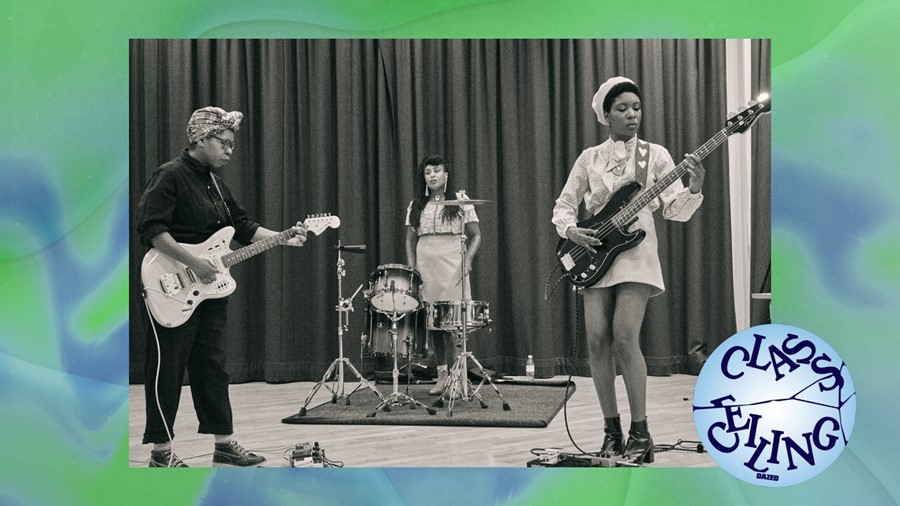As part of our Class Ceiling series, we hear from Chardine from Big Joanie – a feminist punk band from London – about her experiences as a Black, working-class woman in the contemporary UK music industry
In our new Class Ceiling series, we unpack how class actually affects young people today – from our jobs, to the way we have sex, to our general experience of the world. Here, we hear from Chardine from Big Joanie – a feminist punk band from London – about her experiences as a Black, working-class woman in the contemporary UK music industry
Sometimes I feel like if our band was a bunch of white blokes from Leeds, we would be touted as the most radical thing of all time. Two of us [Big Joanie] grew up outside of London, but people don’t actually recognise Black peoples’ class position in Britain. Only working-class people can be white, unless you’re making drill music.
There’s a worrying trend that’s particularly common in the UK, where musicians pretend to be working class, or let people assume they are. They will usually be white blokes with regional accents who are treated as more authentic than someone from a London council estate. You pop on the radio and it’s another white boy band from the north going on about how working-class they are, then it turns out that they went to art school and they live in some posh area of Leeds. It comfortably fits the narrative for what Britain thinks is a good representation of what the working class is, when actually it’s much more diverse than that. But it sells records, so it clearly works. People want to see themselves reflected in the music they listen to; they want that fantasy of being a musician – and most people can only do that through people who reflect their experience.
Britain has a fixation on authenticity, so what we see is musicians thinking that it’s more authentic to pose as working-class than to just be themselves. But they’re only fulfilling what the music press and industry want. It’s either that they want a voice of the people or a social commentary on class that fits the aesthetic that we associate with authenticity. It’s an idea that dates back to the 50s: the group of lads, the Beatles, a band of brothers on the road ‘making it’. It's the sort of fantasy narrative that a lot of white men who run the industry want to engage with and fantasise of as themselves being that. It’s about music, but it’s also about selling ideas to people.
Another problem that’s becoming more apparent is the children of famous musicians getting into bands. They will have never played a gig and yet have a huge record deal; they will have connections handed to them that we worked so hard to get. Maybe it’s always been like this, but it feels like it’s getting increasingly difficult for artists to get noticed without these venues and the connections.
The rock and indie scene is undergoing a middle-classification where less and less working-class musicians can afford to be in bands. For working-class musicians, everything comes out of your own pocket. We’re not the sort of people whose parents paid for our music lessons, we’re self-taught – so small venues are crucial in building up confidence, especially in the early years. With the pandemic shutting down venues, it’s harder to find gigs and make a living.
Becoming a musician takes time and you need a part-time job if you really want to make a career out of it. Sometimes this means relying on the dole so you can have time to actually make music and tour. It also means sacrificing certain things, so you might live in a shit place so you can afford to do stuff. Other people seem to tour for months on end despite not being a massive band, but someone’s clearly subsidising them somewhere, whether that’s parents helping with rent or buying and fixing instruments.
In the UK, there’s an attitude that the arts aren’t important, so it generally excludes a lot of people. For those already living on the breadline, this is particularly catastrophic. If you’re someone like me, who has a part-time job, you rely on gig money to subsidise yourself. So, when the pandemic took that away, you definitely felt the pinch of not having those extra income bits coming in here and there. It was shocking to see massive chunks of peoples’ income gone overnight, particularly as a Musicians’ Union member. That’s why we were all so desperate to play live shows after the pandemic, especially since streaming has made musicians rely on live shows more than ever before.
Everybody does a little merch speech during their sets, because that’s where we make most of our money. Most venues take huge cuts out of band merch, which is a huge loss in income, especially when you consider the money already lost from streaming. Given that we need to do those gigs to get bigger audiences, it’s a Catch 22.
It’s tougher than it’s ever been to be a working-class musician. This is why it’s so important to take a stand: to back campaigns that support bands, join a union, and urge venues to take smaller cuts.
You can find out more about Big Joanie on their website and listen to them on Bandcamp here. You can buy tickets to catch them supporting Bikini Kill and St Vincent on their European tour here




